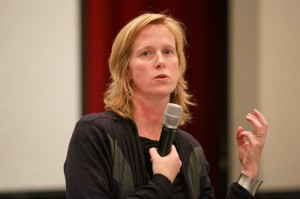
By Bob Bettson
As a nurse at Sanctuary, a Christian outreach program in downtown Toronto, Keren Elumir helped care for people at drop-in programs, on the street and at weekly health clinics, whether it involved washing feet, doing new dressings or stitching up wounds.
A member of the Church of the Resurrection, Toronto, she believes real outreach means going outside of our comfort zone. “Jesus didn’t just wait for people to come to him,” she said.
Ms. Elumir was the keynote speaker at the diocese’s annual Outreach Networking Conference, which brought together about 150 people at Holy Trinity School in Richmond Hill. Participants came from across the diocese, and one even got up at 5:30 a.m. to drive from Huntsville.
Ms. Elmuir said that before Christians jump into social justice issues, they need to “weep” with people who are struggling for justice, and listen to their stories. “You need to know the people you are fighting for.”
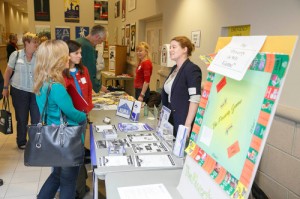
Participants at the conference could attend workshops on a variety of subjects, including the Pikangikum water project, climate change, solidarity with people in poverty, spirituality and social justice, anti-poverty activism, restorative justice, greening parishes, and justice and inclusion.
Murray MacAdam, the diocese’s Social Justice and Advocacy consultant, said the annual conference, in its 13th year, continued to be important for people as a “once-a-year chance to learn more about issues and meet others who share their interest.”
He said social justice work in a parish can be “lonely at times,” but enthusiasm at the conference had remained high, in part because it was an opportunity to network. He noted that for the first time, an anti-poverty workshop was led by a person, Sharon Norman, who was receiving social assistance disability benefits. “We are walking alongside people,” he said.
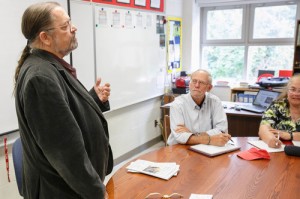
Bishop Mark MacDonald, the national Anglican Indigenous Bishop, talked about solidarity between indigenous people and “settlers” as a way of “walking the talk” of reconciliation. “I like to think the Anglican Church of Canada is waking up from a long, horrible sleep, where nightmares became realities,” he said. Now, he said there is a chance of reconciliation, which is not just a task for indigenous people, but for non-indigenous people as well.
He believes this is a “moment of rediscovering where God has planted seeds of hope.” He said indigenous people “have never given up a spiritual sense of authority and stewardship of the land.” That means resource extraction issues in Canada and throughout the world will be a test of justice for indigenous people.
Teams help keep the peace at home and abroad
By Bob Bettson
When we think of Christian peacemaker teams, we think of people travelling to hotspots like Afghanistan or the Middle East. But the Rev. Bob Holmes, a Roman Catholic priest, told a workshop on solidarity with aboriginal people in Canada that there is much work to do inside Canada.
He gave a case study on a recent clash between aboriginal people in Elsipogtog, New Brunswick, and companies doing seismic testing for fracking near a reserve. (Fracking is a controversial process that injects water and chemicals into the ground to extract natural gas.)
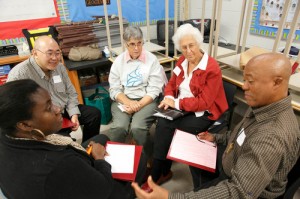
Mr. Holmes said Christian Peacemaker Teams were called in by the Mi’kmaq First Nation after a June demonstration to stop the seismic testing. Protestors had blocked a road used by large testing vehicles called thumpers. The RCMP had arrested 32 people who refused to leave the road. “The RCMP was not gentle, not respectful” of the first nations’ demonstrators, he said.
The Christian Peacemaker Teams, who are invited to help where there is a possibility of violence, arrived at the start of July and began talking to all the parties involved—to Anglophones and Francophones in nearby communities, to indigenous people, to the RCMP and to the companies doing the testing for fracking.
He said that while the companies had permission to do the testing, which was done on crown land, local residents, including indigenous people, all wanted the tests stopped while environmental tests were done to determine if there would be any damage.
The peacemaker teams ran non-violence training. There were more demonstrations but fewer arrests. Seismic testing stopped in August but began again in September. The Mi’kmaq chief ordered the eviction of anyone preparing for fracking. So the dispute goes on, but without much media attention, since Irving Oil controls the local media.
Mr. Holmes said there is much solidarity work to do with aboriginal people in Canada. He has also been part of Christian Peacemaker Teams in Grassy Narrows, Ontario. Other teams this year have gone to Colombia, Iraq and Israel.
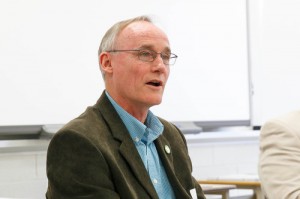
Groups feel chill from federal government
By Bob Bettson
One of the challenges facing churches as they pursue justice issues is the atmosphere of “chill,” particularly with the Harper government, said Joe Gunn, executive director of Citizens for Public Justice (CPJ).
The ecumenical Christian group, which just celebrated its 50th anniversary, moved its offices from Toronto to Ottawa to increase its efforts to influence the federal government.
Mr. Gunn told a workshop that since the Conservatives won a majority in 2011, it has been difficult to do advocacy because there has been less consultation with the government than in the past.
He said Christians are needed more than ever to address social and economic justice issues, but church groups like Kairos have lost federal funding, and the Canadian Revenue Agency has been given $7 million to audit environmental groups to make sure they aren’t “too political.”
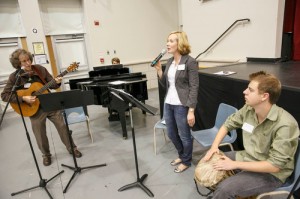
Mr. Gunn said he took two CPJ interns to Parliament Hill recently and they observed scientists, some with their mouths symbolically taped, demanding support for scientific study in the interest of the public good.
CPJ has worked hard on poverty and climate change issues to bring Christian concerns to federal legislators, he said. However, the current government believes it can ignore churches because their leaders don’t represent their members’ views.
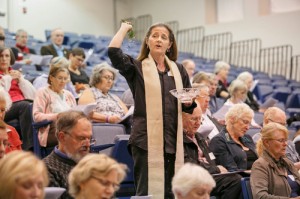
That’s why Mr. Gunn believes educating parishes about advocacy is necessary. The church should encourage local faith communities to work on links between faith and social justice.
Within parishes, there seemed to be four different attitudes towards justice work, he said. One group believes it is “insidious,” believing faith and politics don’t mix. Another group, larger, believes social justice is “irrelevant” and not a core issue for the church. A third group sees justice as an “incidental” part of mission. The final group includes those who believe justice is an “integral” part of the Gospel. The task of the fourth group is to connect with parishioners who fall into the second and third groups.
Workshop participants agreed that social justice work was challenging in the current political climate, but that it can move forward with prayer and with efforts geared to a particular community.
Visit the diocese’s Social Justice and Advocacy webpage.